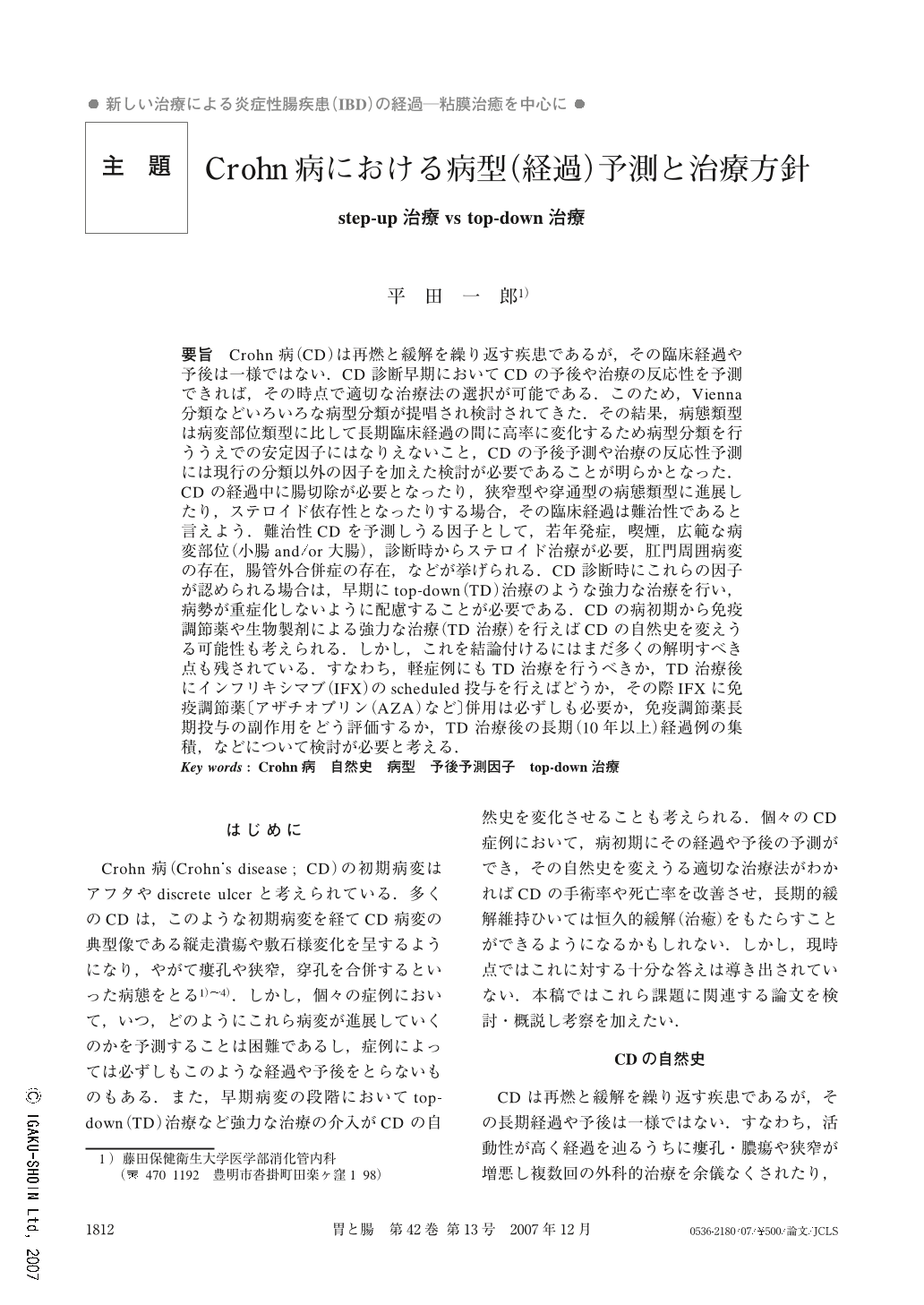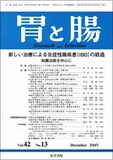Japanese
English
- 有料閲覧
- Abstract 文献概要
- 1ページ目 Look Inside
- 参考文献 Reference
要旨 Crohn病(CD)は再燃と緩解を繰り返す疾患であるが,その臨床経過や予後は一様ではない.CD診断早期においてCDの予後や治療の反応性を予測できれば,その時点で適切な治療法の選択が可能である.このため,Vienna分類などいろいろな病型分類が提唱され検討されてきた.その結果,病態類型は病変部位類型に比して長期臨床経過の間に高率に変化するため病型分類を行ううえでの安定因子にはなりえないこと,CDの予後予測や治療の反応性予測には現行の分類以外の因子を加えた検討が必要であることが明らかとなった.CDの経過中に腸切除が必要となったり,狭窄型や穿通型の病態類型に進展したり,ステロイド依存性となったりする場合,その臨床経過は難治性であると言えよう.難治性CDを予測しうる因子として,若年発症,喫煙,広範な病変部位(小腸and/or大腸),診断時からステロイド治療が必要,肛門周囲病変の存在,腸管外合併症の存在,などが挙げられる.CD診断時にこれらの因子が認められる場合は,早期にtop-down(TD)治療のような強力な治療を行い,病勢が重症化しないように配慮することが必要である.CDの病初期から免疫調節薬や生物製剤による強力な治療(TD治療)を行えばCDの自然史を変えうる可能性も考えられる.しかし,これを結論付けるにはまだ多くの解明すべき点も残されている.すなわち,軽症例にもTD治療を行うべきか,TD治療後にインフリキシマブ(IFX)のscheduled投与を行えばどうか,その際IFXに免疫調節薬〔アザチオプリン(AZA)など〕併用は必ずしも必要か,免疫調節薬長期投与の副作用をどう評価するか,TD治療後の長期(10年以上)経過例の集積,などについて検討が必要と考える.
The natural course of Crohn's disease (CD) is characterized by flare-ups altered with periods of remission, but the clinical course and prognosis are not the same among patients. If we might predict the prognosis and responce to a treatment in each CD patient at the point of diagnosis of CD, the choice of an appropriate therapy would be possible. On this account a varied phenotypic classification was proposed, including the Vienna classification. As a result, it was made clear that the anatomical location of lesions (ileal, ileo-colic, colonic, ano-rectal) was a more stable factor than disease behavior (inflammation, stricturing, penetrating) for classification of the CD phenotype. Futhermore, we should be able to predict the prognosis and responce to a treatment of each CD patient by evaluating additional factors other than the factors in the current classification.
In the case of the need for intestinal resection, the progression towards structuring and/or penetrating behavior and developing steroid dependency in the disease course of CD, it may be said that the patients enter an intractable clinical course. Predictive factors related to the intractable clinical course include young-age onset, active smoking, extensive lesion, need for steroids at diagnosis, perianal disease and extraintestinal manifestation.
When these factors are recognized at the time of CD diagnosis, early induction of the most aggressive treatment such as the Top-down (TD) therapy is necessary in order to prevent the development towards a serious status of disease. The possibility of achieving change in the natural history of CD, using aggressive treatment by TD therapy including immunomodulators (Azathioprine:AZA) and biologics (Infliximab:IFX) from the early stage of CD is considered. However, many points remain to be elucidated before definite conclusions can be reached.
In other words, it is necessary to elucidate whether aggressive therapy should be inducted for unintractable (mild) cases despite the adverse effect of the drugs used. Also, how to add the scheduled therapy of IFX after TD therapy, whether the combination therapy with IFX and immunomodulators is always necessary. We need an accumulation of cases with long term (more than ten years) course treated with TD therapy, in order to make scientific judgments.

Copyright © 2007, Igaku-Shoin Ltd. All rights reserved.


